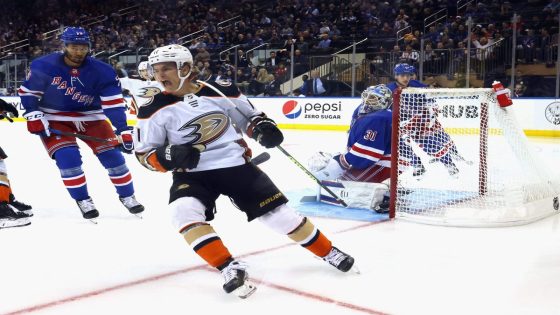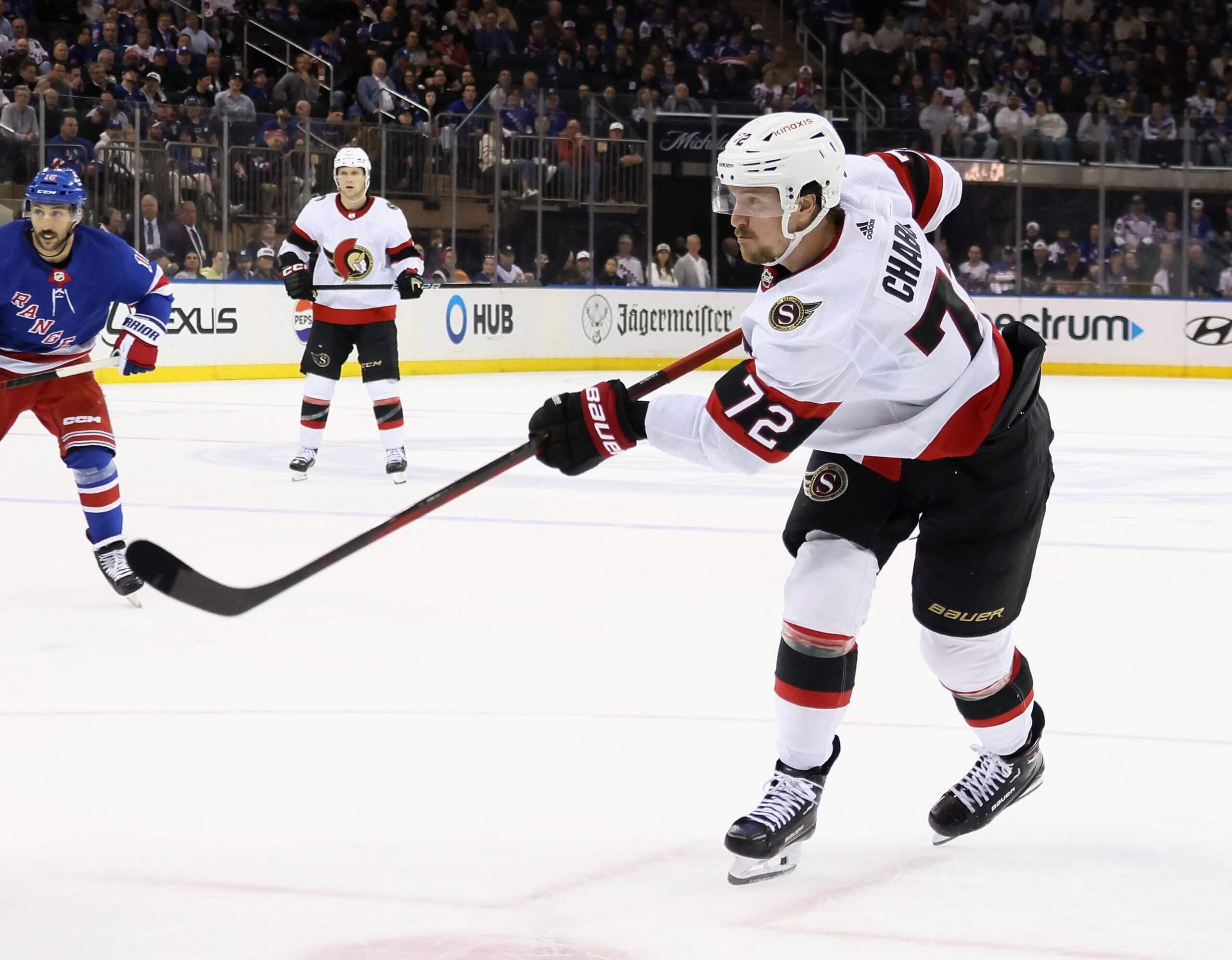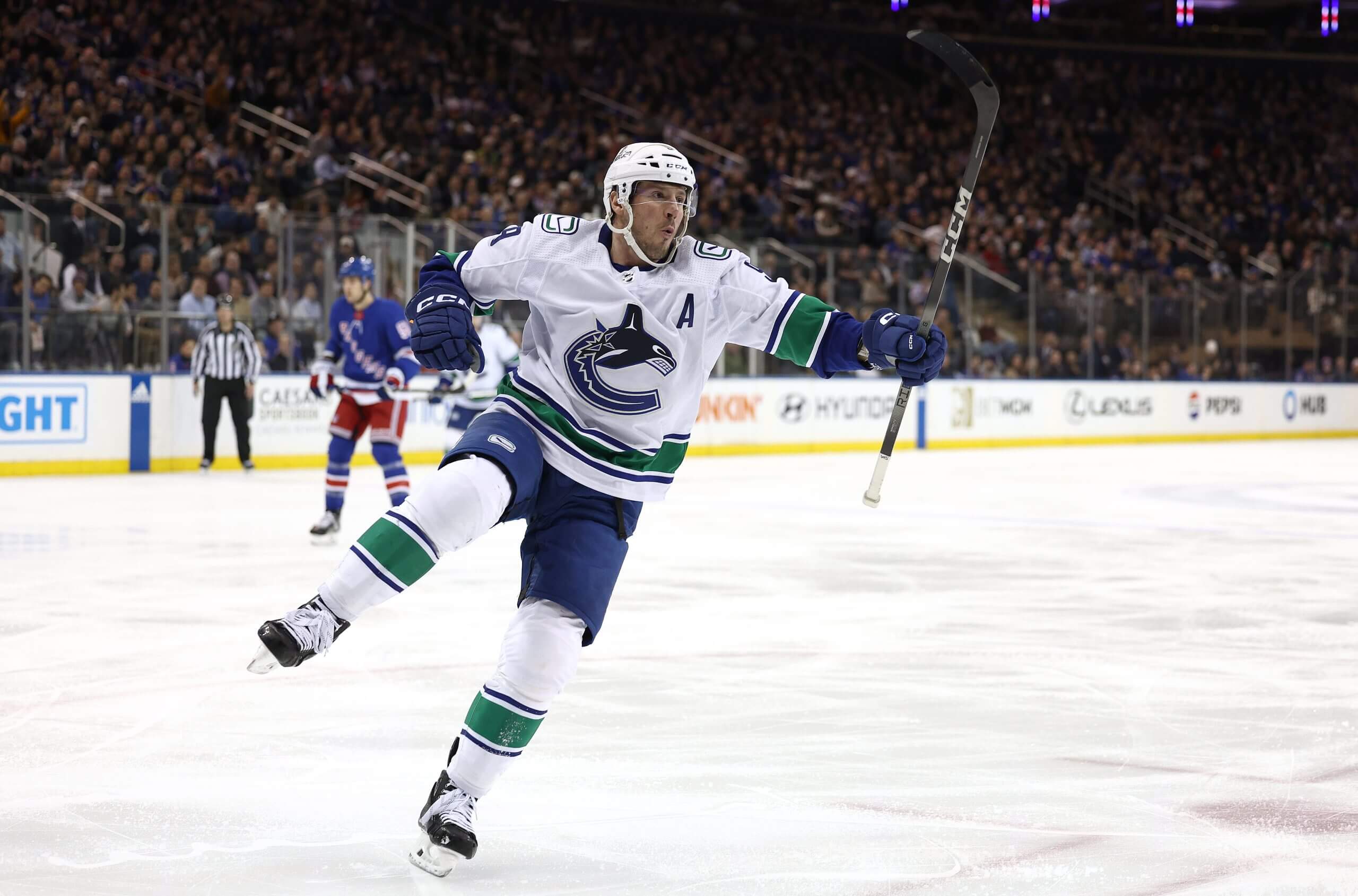The New York Rangers started falling three weeks ago and haven’t stopped, not even through the tumult of last week that ended with Jacob Trouba being shipped to the Anaheim Ducks and Igor Shesterkin signing an eight-year extension. It’s no secret general manager Chris Drury is not only looking to alter his team’s core but also trying to bring in a player or players who can keep the Rangers battling for a playoff spot and maybe even a Stanley Cup.
What could that look like? Let’s stipulate a couple of things here at the top before we get into it:
• No tampering, soft or hard, was committed in the production of this list.
• Making any of these trades is a long shot at any time of the year. Right now, with maybe one or two teams considered out of the playoff picture, it’s darn near impossible. And Drury surely knows he’s going to have to give to get, which means surrendering not the veterans with trade protection he’d love to be rid of but more likely the coveted younger pieces he’s got, either on the current team or in the system.
As a couple of league executives have told me in conversations since the Rangers declared themselves open for business, no one is blowing up Drury’s phone for Chris Kreider or Mika Zibanejad. “Teams want (Will) Cuylle, they want (Victor) Mancini, they want (Gabe) Perreault,” said one Western Conference exec.
So the speculation on trade returns for the players here is based on those assumptions.
Drury has shown himself incredibly adept at limiting the damage in trades, though he’s made so many in his three seasons that the Rangers have no second- or fourth-round picks in the next three drafts. He’s got some prospects, his 2025 and 2026 first-rounders and whatever he can peel off the current roster to make a big splash.
Here’s who he could go after.
Thomas Chabot, LHD, Senators
Why they’d want him: The Rangers have a big decision looming on K’Andre Miller, who is likely seeking to double his current $3.872 million salary as a pending restricted free agent. Miller has looked lost this season. He’s not alone, but Drury and the Rangers brain trust must be having second thoughts about opening the Garden vault for a long-term deal. Chabot is three years older than Miller and makes $8 million per, but he’s got three years left on his deal, so there’s not as much term committed as the Rangers would need to provide for Miller. Chabot is also the sort of reliable minutes-eater this Rangers defense corps desperately needs.
What it would cost: Miller, for starters. Probably more than that since Miller is an RFA. The Rangers may want to alter their forward group more and add players with bite up front, but the team’s defense has taken a step back even with Trouba gone. If Chabot is even up for discussion, that’s a conversation the Rangers want to be in.
Now, this week’s “soft tampering” allegations by Senators owner Michael Andlauer could mean a Rangers-Senators trade of any kind is off the table. But if Ottawa has a guy the Rangers like, those things surely can be smoothed over. Maybe.
Trent Frederic, C, Bruins
Why they’d want him: Frederic has career highs of only 18 goals and 40 points, but the 26-year-old gives the Rangers something their forward group sorely lacks, and that’s some snarl. He’s a physical player who has some skill and is playing for a big raise off his current $2.3 million salary. The Bruins have the cap space to accommodate a big raise for Frederic, but if the Rangers come calling with a serious offer, perhaps there’s some room to maneuver.
What it would cost: Kaapo Kakko, another RFA in line for a raise, might make sense as the main piece going to Boston, but I wouldn’t think that would entice the Bruins enough. Would they consider Filip Chytil? The Rangers likely don’t want to part with Chytil, who — when healthy — gives them a speed aspect down the middle they don’t have otherwise, but again, you have to give to get. And making a pre-Christmas hockey trade means you really have to give. Kreider’s a Boston native so the Bruins might not be on his 15-team no-trade list. Acquiring Frederic could be a way to bring in a heavier forward and send Kreider out if that’s what the Rangers still want, though that’s hardly a one-for-one option. The Rangers would have to give up more than that.
Ivan Provorov, LHD, Blue Jackets
Why they’d want him: He’s a poor man’s Chabot who could be had for much less and still provide a top-four jolt to the D corps. Provorov eats up a ton of minutes for a Columbus team that’s been competitive this season, plus he’s a pending unrestricted free agent whose cap hit ($4.725 million) could be easily absorbed by the Rangers.
What it would cost: A first-round pick is probably the “buy now” price. The Rangers would have to make room on the left side for Provorov so maybe this is a move made in anticipation of or after the Rangers move Ryan Lindgren, their own left-side pending UFA, in a separate deal.
Alex Tuch, RW, Sabres
Why they’d want him: Tuch has produced well since going to Buffalo in the Jack Eichel deal four seasons ago, but the Sabres are still stuck in neutral, heading toward a 14th straight draft lottery. The Rangers would love to have Tuch’s size and physicality on the right side, which in recent years has been a black hole in the top six. He also has a year left at a very reasonable $4.75 million average annual value, which the Rangers could take on without having to move anything out.
What it would cost: Getting a low-cost, under-30 forward who scores 60 to 70 points per year would require a premium going back. The ask would surely be Perreault; Drury has to decide whether his top prospect is worth making such a big splash. Alexis Lafrenière might be a name teams would be asking for in such a trade too. Moving Lafrenière seems ridiculous given what the Rangers are trying to do, but perhaps there’s nothing off the table in pursuit of changing the core here.
Joel Farabee, LW, Flyers
Why they’d want him: There have been some solid moments in Farabee’s six seasons in Philly, but he seems to have fallen out of favor during this lengthy rebuild. The Rangers could use another top-nine wing who’s under 25 and can score — who couldn’t?
What it would cost: The Flyers have an interesting mix up front. Would they take Kreider as part of the return? A Kreider-John Tortorella reunion is fantasy-land stuff but the Rangers would have to work hard to find a fit in this trade.
Trevor Zegras, C, Ducks
Why they’d want him: This is one with perhaps more interest on the player’s side than the team’s side. Zegras is a local kid and trains every offseason with Kreider and Jonathan Quick. And his past couple of seasons in Anaheim have been injury-plagued and not much fun, so the 23-year-old could welcome a change of scenery. The injury issues — Zegras is currently sidelined with a lower-body injury — might give the Rangers pause, but Zegras is a unique talent who might be able to add something new to the mix.
What it would cost: This feels like it wouldn’t be a crazy return even though Zegras is only a couple of years removed from back-to-back 60-point seasons. Would Kakko-plus be enough? Maybe not. Is this a spot to go big and try to ship Miller out and bring Cam Fowler in for the short term?
Brady Tkachuk, C, Senators
Why they’d want him: You knew we’d get here eventually with this list! Even if Andlauer and the Sens are adamant Tkachuk is not available, there’s a reason the Rangers would have interest. Tkachuk is a pain in the butt to play against, has high skill and is only 25. There are 31 teams who’d want that.
What it would cost: Any deal starts with Lafrenière as the centerpiece but wouldn’t end there. Even if Tkachuk wanted to be moved and the Senators were open to it, the trade conversations would get awfully sticky.
J.T. Miller, C, Canucks
Why they’d want him: For the same reasons the Rangers wanted him at the 2021-22 deadline: He’s got high-end skill and he loves to mix it up. Miller has upped his game over the years to become a top-line player, and if he were to come back to the Rangers, he’d certainly keep that status.
What it would cost: The roster situation and Miller’s contract, with five years left at $8 million per, mean there’s only one trade fit: Zibanejad. That means trying to get Zibanejad to waive his no-move and also convincing the Canucks that it’s a fair swap. Probably going to have to keep dreaming on this one.
Dylan Cozens, C, Sabres
Why they’d want him: He’s a talented two-way player who’s only 23 and provides cost certainty, albeit at a pretty high cost ($7.1 million per for the next five seasons). The Sabres are spinning their wheels, and perhaps Cozens is one of the core players who could be best served elsewhere.
What it would cost: Buffalo is pretty well stocked on the blue line so this would be one where the money out would have to be close to the money in. I’m sure the Rangers would love to be able to move Zibanejad in this kind of deal, but the price is more likely Lafrenière, which feels a bit moot. You’d rather have Laf’s upside than start over with someone new.
Jonas Brodin, LHD, Wild
Why they’d want him: He’s 31 so that’s not exactly ideal but Brodin (currently on injured reserve) plays over 22 minutes a night and provides incredible stability, as he’s done for the bulk of his 13 seasons in Minny. At $6 million for the next three years, there’s some reasonable cost certainty for a guy who could slot in alongside Adam Fox for a little while.
What it would cost: Trading K’Andre Miller straight up for a player seven years older seems like a career-ender for Drury. But if you’re remaking the team and trying to find sure things rather than hoping younger players like Miller can become the consistent, top-pair player Brodin already is, that’s maybe worth considering.
(Top photo of Trevor Zegras: Bruce Bennett / Getty Images)








